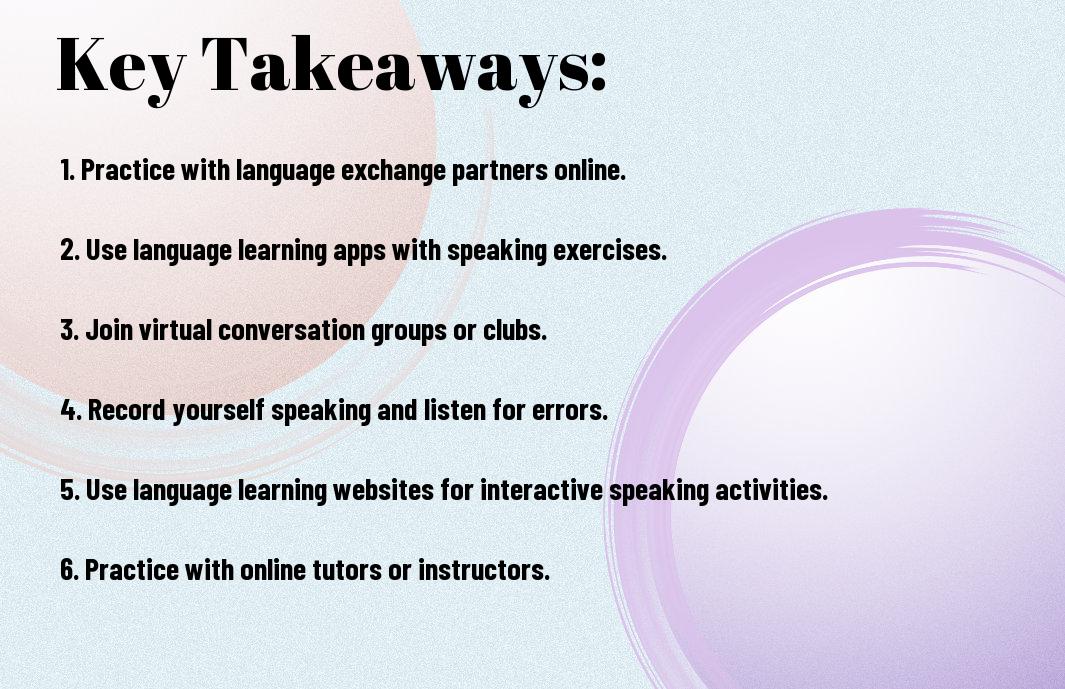It’s frustrating when there are no native speakers around to practice a new language with. However, there are still plenty of effective methods you can use to hone your speaking skills. From language exchange apps like HelloTalk to shadowing native speakers in movies or podcasts, there are creative ways to immerse yourself. Dive into this insightful Learning a language without speaking with natives discussion for more tips and inspiration.
Key Takeaways:
- Practice speaking with language exchange partners: Utilize language exchange platforms to connect with native speakers who are looking to learn your language. This allows for practice conversations and feedback.
- Utilize language learning apps: Use language learning apps that have speaking exercises and interactive lessons to practice pronunciation and conversational skills.
- Join language conversation groups or clubs: Look for local language conversation groups or clubs where you can practice speaking with other learners or language enthusiasts. This provides an opportunity for immersion and real-life practice.

Creating a Language Learning Environment
Setting up a conducive space for practice
For you to effectively practice speaking a new language, it’s crucial to create a conducive environment that promotes language learning. Find a quiet space where you can focus without distractions. Make sure the area is well-lit and comfortable, allowing you to concentrate on your language practice sessions.
Using language learning apps and software
Apps and software have revolutionized language learning, offering interactive and engaging ways to practice speaking. Take advantage of these tools to enhance your language skills. Many apps provide features like voice recognition, pronunciation exercises, and simulated conversations to help you practice speaking in a new language.
In addition to traditional language learning methods, incorporating apps and software into your language practice routine can offer convenience and flexibility. These resources often allow you to practice speaking at your own pace and track your progress, giving you valuable feedback on your language skills.

Self-Practice Techniques
Recording yourself and listening to the playback
Some effective ways to practice speaking a new language when there are no native speakers nearby include recording yourself and listening to the playback. For this technique, you can choose a conversation topic or read a passage aloud in the target language, recording your voice as you speak. Afterward, listen to the playback critically to identify areas where you can improve your pronunciation, intonation, and fluency. This self-assessment can help you gauge your progress and make necessary adjustments.
Speaking aloud to improve pronunciation and intonation
Speaking aloud is another great way to practice and refine your pronunciation and intonation in a new language. You can choose to read a passage from a book, recite a poem, or even practice tongue twisters to work on your articulation. By focusing on clarity, rhythm, and stress in your speech, you can gradually enhance your speaking skills. It may feel awkward at first, but with consistent practice, you’ll notice significant improvements in your ability to enunciate words correctly and convey meaning effectively.
Recording yourself and listening to your pronunciation can provide valuable feedback on areas that need improvement. By comparing your recordings to native speakers, you can pinpoint specific sounds or intonations that may require more practice.
Shadowing native speakers’ audio or video recordings
The technique of shadowing involves closely mimicking the speech patterns and intonation of native speakers in audio or video recordings. By listening to and repeating after native speakers, you can not only improve your pronunciation but also internalize the rhythm and cadence of the language. This method helps you become more attuned to the natural flow of conversation and enhances your overall speaking proficiency.
The audio or video recordings you choose should feature clear and articulate native speakers to provide you with excellent models to emulate. Focus on matching their pace, tone, and emphasis to develop a more authentic and fluid speaking style in the new language.

Finding Alternative Conversation Partners
For those looking to practice speaking a new language when no native speakers are nearby, finding alternative conversation partners can be a great solution. Here are some effective ways you can do this:
Language exchange websites and apps
To practice speaking a new language, you can utilize language exchange websites and apps where you can connect with native speakers who are looking to learn your language. These platforms allow you to engage in language exchanges where you spend time speaking in each other’s native languages, providing valuable practice for both parties.
Online language communities and forums
Language enthusiasts often gather in online communities and forums to discuss language learning, share resources, and practice their skills. Joining these platforms can give you access to a network of language learners from around the world with whom you can engage in conversations and seek feedback on your speaking abilities.
For instance, websites like Reddit have dedicated language learning communities where you can interact with speakers of your target language and participate in language exchange programs or speaking practice sessions.
Social media groups for language learners
Alternative to language exchange platforms and forums, social media groups dedicated to language learners offer another avenue for finding conversation partners. You can join Facebook groups, LinkedIn communities, or language-specific forums on platforms like Discord to connect with like-minded individuals who share your passion for learning a new language.
communities.
Immersion through Media
After your regular language learning sessions, you can further immerse yourself in the target language through various forms of media. Watching TV shows and movies in the target language is a great way to practice your listening skills and pick up on conversational phrases and expressions. Choose genres that interest you, whether it’s comedy, drama, or documentaries, as this will keep you engaged and motivated to continue practicing. Subtitles in the target language can also be helpful, allowing you to read along as you listen and improve your comprehension.
Watching TV shows and movies in the target language
Media such as TV shows and movies provide a valuable opportunity to hear the language spoken naturally and in different contexts. By immersing yourself in the dialogues and storylines, you can improve your pronunciation and accent, as well as expand your vocabulary. Additionally, watching content in the target language can help you become familiar with the culture and mannerisms of native speakers.
Listening to podcasts and radio shows
Movies, radio shows, and podcasts are invaluable resources for language practice. Podcasts, in particular, offer a wide range of topics and styles, allowing you to choose content that aligns with your interests. Through listening to native speakers converse on various subjects, you can enhance your listening comprehension and become more accustomed to the rhythm and flow of the language.
Radio shows are another excellent way to expose yourself to the target language, as they often feature real-time conversations and interviews. Tuning in regularly can help you tune your ears to different accents and speech patterns, making it easier for you to understand and communicate effectively in various language settings.
Reading books and articles in the target language
Podcasts are not the only way to improve your language skills through media. Reading books and articles in the target language can significantly boost your vocabulary and grammar knowledge. Start with materials that are at your current proficiency level and gradually work your way up to more complex texts. You can also take notes of new words or phrases to reinforce your learning and track your progress over time.
Understanding the context in which words are used in written form can also help you grasp the nuances of the language. By exposing yourself to different writing styles and genres, you can improve your reading comprehension and overall language proficiency.
Role-Playing and Simulation
Not having native speakers nearby can make practicing speaking a new language a challenge, but role-playing and simulation can be effective techniques to improve your conversational skills.
Practicing conversations in different scenarios
Different scenarios can help you practice speaking skills in various situations. Try role-playing scenarios like ordering food at a restaurant, making small talk with a stranger, or negotiating a price at a market. By simulating these real-life interactions, you can become more comfortable and confident in using the language in different contexts.
Using flashcards to simulate real-life interactions
Role-playing with flashcards is a great way to simulate real-life interactions in a controlled setting. Create flashcards with common phrases or questions you might encounter in everyday conversations and practice responding to them as if you were having a conversation with a native speaker. This method can help you improve your vocabulary, grammar, and pronunciation in a low-pressure environment.
Another effective way to practice speaking a new language when there are no native speakers nearby is by using flashcards to simulate real-life interactions. By incorporating flashcards into your language practice routine, you can enhance your conversational skills and boost your confidence in using the language.
Creating a mock conversation with a language exchange partner
Any language exchange partner can serve as a valuable resource for creating mock conversations to practice speaking. Find someone who is also learning a language and take turns role-playing different scenarios such as introducing yourself, discussing hobbies, or sharing travel experiences. This interactive approach allows you to practice speaking naturally and receive immediate feedback to improve your language skills.
Creating a mock conversation with a language exchange partner is a dynamic way to simulate real-life interactions and enhance your language proficiency. By engaging in mock conversations regularly, you can build fluency, improve pronunciation, and gain cultural insights that will enrich your overall language learning experience.
Overcoming Common Challenges
Dealing with self-consciousness and fear of mistakes
All language learners face feelings of self-consciousness and fear of making mistakes when practicing speaking. However, these emotions can hinder your progress. Remember that making mistakes is a natural part of the learning process. Embrace them as opportunities to improve and grow. Surround yourself with a supportive environment where you feel comfortable expressing yourself without judgment. This can be through language exchange meetups, online communities, or with a language learning partner.
Managing time and staying motivated
On your language learning journey, managing your time effectively and staying motivated are crucial. Set aside dedicated time each day for practicing speaking. It could be as little as 10-15 minutes initially, gradually increasing as you become more comfortable. To stay motivated, set specific goals for your speaking practice, whether it’s having a short conversation with a native speaker or mastering a particular topic. Reward yourself for meeting these milestones to keep your enthusiasm high.
Managing your time wisely is key to making consistent progress in speaking a new language. Create a schedule that includes regular speaking practice sessions and stick to it. Find ways to integrate language learning into your daily routine, such as listening to podcasts or practicing with language learning apps during your commute or while doing household chores.
Finding accountability and tracking progress
To ensure you stay on track with your language learning goals, finding accountability partners can be incredibly beneficial. Join language learning groups or forums where you can share your progress and challenges with like-minded individuals. Setting up regular check-ins with a language exchange partner can also keep you accountable and motivated to practice your speaking skills consistently. Additionally, track your progress by keeping a language learning journal or using apps that monitor your speaking improvement over time.
Accountability is crucial in language learning as it provides external motivation and support on your journey. When you have someone holding you accountable, you are more likely to stay committed to your speaking practice and push through any challenges that may arise.
Conclusion
To wrap up, when you don’t have access to native speakers to practice a new language, there are several effective methods you can utilize to improve your speaking skills. Consistent practice through language exchange platforms, shadowing native speakers in movies or songs, utilizing language learning apps, joining online language communities, and simulating real-life conversations are all valuable strategies that can help you enhance your speaking abilities even without direct interaction with native speakers. Do not forget, the key is to practice regularly and immerse yourself in the language as much as possible to make significant progress.
If you are interested in more tips and discussions on how to fluently speak a new language without engaging with native speakers, you can visit this forum for additional resources and insights from language learners around the world. Keep practicing and stay motivated on your language learning journey!
FAQ
Q: What are some effective ways to practice speaking a new language when there are no native speakers nearby?
A: One effective way to practice speaking a new language without native speakers nearby is to engage in conversation with language exchange partners online. There are various platforms and apps available where you can connect with native speakers who are also looking to practice a different language.
Q: How can I improve my pronunciation when practicing a new language on my own?
A: To improve your pronunciation when practicing a new language solo, you can listen to native speakers through videos, podcasts, or language learning apps. Mimicking their pronunciation and practicing tongue twisters or phonetic exercises can also help you enhance your speaking skills.
Q: Are there any other ways to practice speaking a new language besides language exchange partners?
A: Yes, besides language exchange partners, you can practice speaking a new language by talking to yourself in that language, describing your daily routines, thoughts, or surroundings. Additionally, recording your voice and listening to it can help you identify areas for improvement and track your progress in speaking the language.


